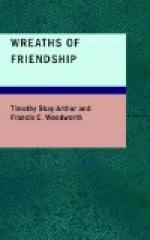“Don’t think of it, dear sister; don’t think of it any more,” said Eliza. “You was not well last night, and I have often heard, that when people are ill, their dreams are more apt to be disturbed. But we will not say any more about it now, dear.”
“No,” said Maria; “we shall all feel too sad, if we do.” And she made an effort to be cheerful; though tears stood in her eyes as she spoke.
“I don’t know why it makes others feel sad to think of heaven,” said the favorite. “I should love dearly to go there.”
“But then it is so dreadful to die!”
“I know it; but mother was so happy when she died!”
“Would you be willing to leave your sisters, dear Sue?”
“No; not unless I could see my mother and Christ. Oh, I do love Christ more than all the rest of my friends! Do you think that is wrong?”
The three sisters slowly and thoughtfully bent their steps homeward, and just as the sun was setting, and the western clouds were spread with the beauty and glory of twilight, they entered that cottage which, though the abode of sorrow, was yet dear and sacred to them, because it was once the home of their mother.
From that time, the gentle, loving, thoughtful little Sue, faded—faded as a flower in the autumn wind. She had not been well for weeks; and soon it was evident that she was rapidly declining. Was her dream a cause or an effect—a cause of her decline, or an effect of an illness already preying upon her frail system? Perhaps we cannot tell. There is something very remarkable about many dreams. It is not easy to account for them all, by what is known of the laws of the mind. But we must not stop now to inquire into this matter.
Step by step, that cherished sister went downward to the grave; and before the summer had come, while the early violet and the pure anemone were still in bloom, God called her home. Peacefully and beautifully her sun went down. “They have come,” she said. So died the youngest—the favorite child.
THE MINE.
[Illustration: THE MINE.]
There are three kingdoms in nature—the Mineral kingdom, the Vegetable kingdom, and the Animal kingdom—the former for the sake of the latter, and all for the sake of man. Without the Vegetable kingdom animals could not exist, and without the Mineral kingdom vegetables could not exist.
It is also worthy of remark, that in all the inferior kingdoms of nature, there is an image of what is superior. The lowest of all the kingdoms is the Mineral kingdom, where every thing takes a fixed form, and where all changes are the work of centuries, instead of days and months, as in the Vegetable and Animal kingdoms. Yet, in this dull, inert kingdom, we find a certain image of the one next above, in the upright or orderly forms into which many of its substances arrange themselves. Under circumstances of more than usual freedom, particles of matter in this kingdom will assume shapes so nearly




